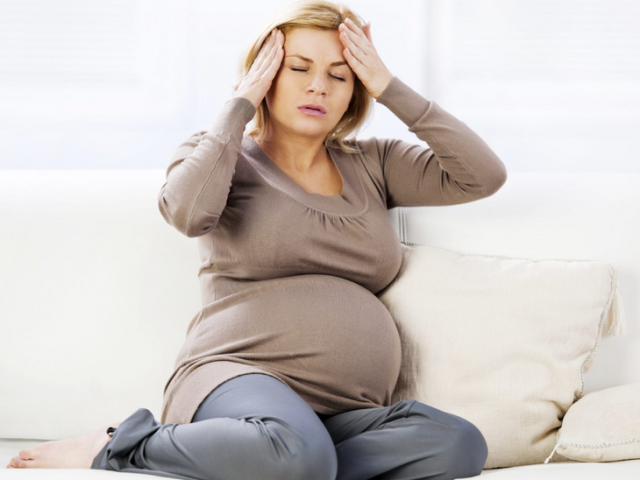Pregnancy causes physiological changes in the body of a woman who entail a whole range of emotions, which is quite expected and normal. Stress and nervousness is a common occurrence during pregnancy, but they should be distinguished from each other.
Read on our website another article on the topic: "Methods of combating stress and depression in women and men". You will find useful information about 10+ steps to a happy life.
Neurosis may be the result of stress and stress. Depending on the intensity, the human condition ranges from a slight tremor to a more serious disorder of the nervous system, up to panic attacks. Stress is a normal reaction to changes, including pregnancy. He performs his protective function, which is very important during the expectation of childbirth. But how dangerous is this condition for the baby and mother? It is described in detail in the article. Read further.
Content
- What is stress?
- Does the child feel stress in the womb in the early stages, in the second, third trimester?
- Frequent causes of stress during pregnancy: List
- How does constant pregnancy stress affect: how dangerous is it to the expectant mother and child?
- Video: Stress during pregnancy. What is the danger of chronic stress for pregnancy and fetal development.
- Video: How stress during pregnancy affects the development of the child
- Video: Stress during pregnancy / Effective ways to overcome stress during pregnancy
What is stress?

Stress is, simply speaking, an excess of information, the impact from the outside, on which our body is trying his best to react. Such a test may be associated with work, finances, relations with other people and everything that can represent for us a real or imaginary threat.
Stress is an important survival factor. The “hit or run” mechanism suggests when and how to respond to danger. However, if this mechanism is launched too easily or at the same time too many crisis situations occur, stress jeopardizes the mental and physical health of a person.
Several key facts about stress:
- This condition helps the body prepare for danger.
- Its symptoms can be both physical and mental.
- Short -term stress can be useful, but prolonged is associated with a number of diseases.
- We can prepare for stress if we learn some self -government tips.
- Each person reacts differently to crisis situations in his life, but too strong and prolonged stress can lead to health problems.
- Stress is a natural defense of the body from external threats. At a critical moment, the body is saturated with hormones in order to properly prepare for a meeting with danger.
The body produces a larger number of chemicals: cortisol, adrenaline and norepinephrine. They cause a rapid heartbeat, increased muscle readiness, sweating and vigilance. All these factors improve a person’s ability to respond to a dangerous or difficult situation. Pregnant women are no exception. The body is a complex system. Read further.
Does the child feel stress in the womb in the early stages, in the second, third trimester?
Numerous studies have shown that the fetus feels the stress and nervousness of the mother, as well as other emotions that change during pregnancy. However, future mothers are often too worried, reading such studies. So, does the child feel stress in the womb in the early stages, in the second, third trimester?
It's important to know:
- The level of stress is not transmitted directly from mother to child
- The placenta produces enzymes that protect the child from excessive stress
- Only about 10% cortisol reaches the fetus developing in the womb.
However, chronic stressful situations, excessive nervous tension can lead to a number of problems with the health of the mother and child. It is important to put yourself to the forefront, because negative changes will affect first of all the mother, and only then the baby.
Frequent causes of stress during pregnancy: List

The very fact of detection of pregnancy can be a stress for the future mother, especially if all this happened in an unplanned manner. Even when planning a family, the news about the appearance of the baby causes excitement. It is no coincidence that pregnancy is sometimes called the “second state”, because it brings changes and, therefore, the problems that need to be adapted. The body, emotions, thoughts, habits, relationships are changing. And all these changes pursue only one goal: to prepare the future mother for a new role and the birth of a baby. Below you will find a list of frequent causes of stress during pregnancy.
Situations that can cause stress in this difficult, but joyful time for a woman:
- Waiting for the results of prenatal tests
- Previous negative experience of pregnancy, childbirth or motherhood (for example, abortion during a previous pregnancy)
- Complications during pregnancy
- Insomnia
- Toxicosis and other uncomfortable conditions
Situations that are not directly related to pregnancy, but can additionally cause severe stress related to changes and problems in a woman’s life:
- Unfavorable financial situation, loss of work
- Divorce or problems in partnership during pregnancy
- Death or disease of loved ones
- Conflicts (from family to international)
- Problems with drugs, alcohol or mental disorders
IMPORTANT: The level of stress during pregnancy must be controlled and reduced if possible.
The light experiences that are present in everyday life are not dangerous to the health of the mother and child. On the contrary, recent studies indicate the positive effect of the stress hormone, which is observed in the active life of a pregnant woman. A slight increase in cortisol in the blood leads to the secretion of oxytocin, the hormone of love and happiness.
It is worth knowing: Oxytocin is attributed a strong connection between mother and child, and on the other hand, scientists associate him with stress resistance.
Small unrest during pregnancy caused by adaptation to new living conditions, going to work, examinations, etc., prepare the child for life in the outside world, creating the best conditions for a easier overcoming critical situations. However, chronic and severe stress can have much more serious negative consequences for the health of mom and child.
How does constant pregnancy stress affect: how dangerous is it to the expectant mother and child?
The stress hormone can even affect genetic material, but only if it is associated with serious injuries, violence, cruel circulation, complex financial situation and the struggle for survival. In situations of long -term and constant secretion of stress hormones, the role of which consists in protecting the human body and the struggle for survival, changes in DNA occur. They are activated by an epigenome responsible for transgeneration epigenetic inheritance. In fact, these changes are prepared even by the next generation for life, which is under the constant action of cortisol.
How does constant pregnancy stress affect? How dangerous is it to the future mother and child? This condition can cause:
- Headaches, nervousness, tension, sleep problems, rapid breathing and pulse
- Eating disorders (overeating or lack of appetite)
- High blood pressure, heart disease and diabetes that may occur at a later age
- Obsessive thoughts, anxiety or depression
Chronic stress can also adversely affect the growth and development of the child in the womb, as well as on the gestational age in terms of premature birth. In the future, this affects the physical and mental development of the baby.
Future mothers should keep in mind that stress is more dangerous for them than for the baby, and taking care of their mental health is an important condition for educating a healthy and harmoniously developed child.







